

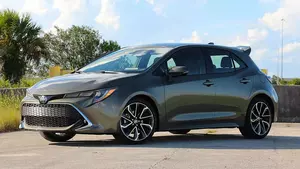
2019 Corolla XII (E210)
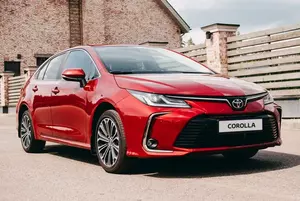
2020 Corolla XII (E210) (US)
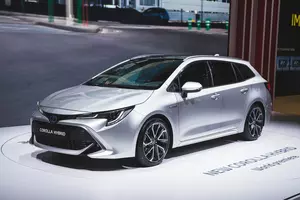
2019 Corolla Touring Sports XII (E210)
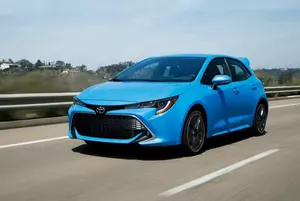
2019 Corolla Hatchback XII (E210)

2017 Corolla Axio XI (facelift 2017)

2017 Corolla Fielder XI (facelift 2017)
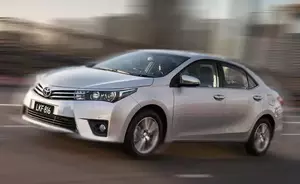
2016 Corolla XI (E170, facelift 2016)

2017 Corolla iM
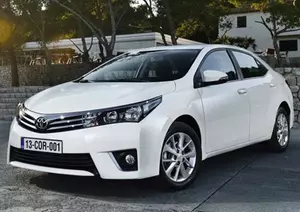
2013 Corolla XI (E170)

2013 Corolla Fielder XI
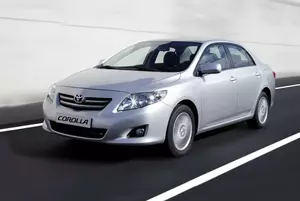
2007 Corolla X (E140, E150)
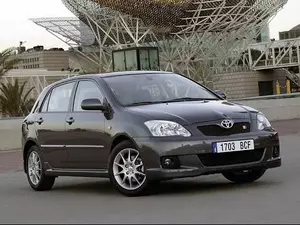
2002 Corolla IX (E120, E130)
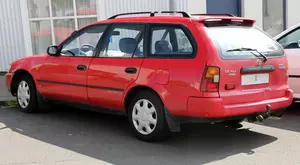
1998 Corolla Wagon VIII (E110)

2001 Corolla Runx
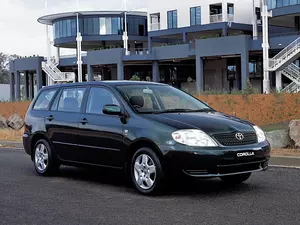
2002 Corolla Wagon IX (E120, E130)
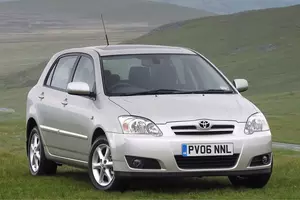
2002 Corolla Hatch IX (E120, E130)

2000 Corolla Fielder IX

1998 Corolla Hatch VIII (E110)

1998 Corolla VIII (E110)

1993 Corolla Compact VII (E100)
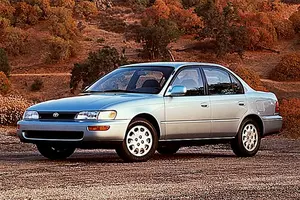
1993 Corolla VII (E100)
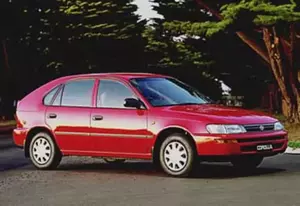
1993 Corolla Hatch VII (E100)
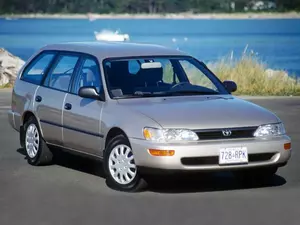
1993 Corolla Wagon VII (E100)
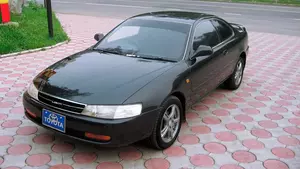
1992 Corolla Levin

1988 Corolla Wagon VI (E90)
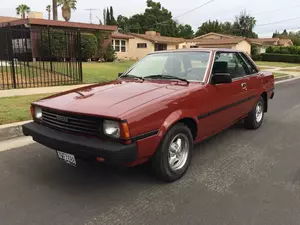
1983 Corolla Coupe V (E80)

| Vehicle | Curb weight | Difference from world's smallest | Weight to power ratio | 0—60 mph acceleration ratio | Consumption ratio |
|---|---|---|---|---|---|
| 1.8 |
1293 kg / 2851 lbs |
868 kg (1914 lbs) heavier | 9 kg to 1 hp | - |
187 kg/L (412 lbs/L) |
| 1.6i |
1340 kg / 2955 lbs |
915 kg (2018 lbs) heavier | 10 kg to 1 hp | 138 kg/s (304 lbs/s) |
231 kg/L (509 lbs/L) |
| 1.8i |
1310 kg / 2889 lbs |
885 kg (1952 lbs) heavier | 13 kg to 1 hp | 125 kg/s (276 lbs/s) |
385 kg/L (849 lbs/L) |
| Vehicle | 1.8 |
|---|---|
| Curb weight |
1293 kg / 2851 lbs |
| Difference from world's smallest | 868 kg (868 lbs) heavier |
| Weight to power ratio | 9 kg to 1 hp |
| 0—60 mph acceleration ratio | - |
| Consumption ratio |
187 kg/L (412 lbs/L) |
| Vehicle | 1.6i |
| Curb weight |
1340 kg / 2955 lbs |
| Difference from world's smallest | 915 kg (915 lbs) heavier |
| Weight to power ratio | 10 kg to 1 hp |
| 0—60 mph acceleration ratio | 138 kg/s (304 lbs/s) |
| Consumption ratio |
231 kg/L (509 lbs/L) |
| Vehicle | 1.8i |
| Curb weight |
1310 kg / 2889 lbs |
| Difference from world's smallest | 885 kg (885 lbs) heavier |
| Weight to power ratio | 13 kg to 1 hp |
| 0—60 mph acceleration ratio | 125 kg/s (276 lbs/s) |
| Consumption ratio |
385 kg/L (849 lbs/L) |

| Vehicle | Curb weight | Difference from world's smallest | Weight to power ratio | 0—60 mph acceleration ratio | Consumption ratio |
|---|---|---|---|---|---|
| 2.0 |
1411 kg / 3111 lbs |
986 kg (2174 lbs) heavier | 8 kg to 1 hp | - |
204 kg/L (450 lbs/L) |
| 1.8 |
1383 kg / 3050 lbs |
958 kg (2113 lbs) heavier | 11 kg to 1 hp | - |
307 kg/L (677 lbs/L) |
| Vehicle | 2.0 |
|---|---|
| Curb weight |
1411 kg / 3111 lbs |
| Difference from world's smallest | 986 kg (986 lbs) heavier |
| Weight to power ratio | 8 kg to 1 hp |
| 0—60 mph acceleration ratio | - |
| Consumption ratio |
204 kg/L (450 lbs/L) |
| Vehicle | 1.8 |
| Curb weight |
1383 kg / 3050 lbs |
| Difference from world's smallest | 958 kg (958 lbs) heavier |
| Weight to power ratio | 11 kg to 1 hp |
| 0—60 mph acceleration ratio | - |
| Consumption ratio |
307 kg/L (677 lbs/L) |

| Vehicle | Curb weight | Difference from world's smallest | Weight to power ratio | 0—60 mph acceleration ratio | Consumption ratio |
|---|---|---|---|---|---|
| 2.0 |
1465 kg / 3230 lbs |
1040 kg (2293 lbs) heavier | 10 kg to 1 hp | 190 kg/s (419 lbs/s) |
396 kg/L (873 lbs/L) |
| 1.8i |
1290 kg / 2844 lbs |
865 kg (1907 lbs) heavier | 13 kg to 1 hp | 123 kg/s (271 lbs/s) |
391 kg/L (862 lbs/L) |
| 1.2 Turbo |
1315 kg / 2900 lbs |
890 kg (1963 lbs) heavier | 11 kg to 1 hp | 145 kg/s (320 lbs/s) |
239 kg/L (527 lbs/L) |
| Vehicle | 2.0 |
|---|---|
| Curb weight |
1465 kg / 3230 lbs |
| Difference from world's smallest | 1040 kg (1040 lbs) heavier |
| Weight to power ratio | 10 kg to 1 hp |
| 0—60 mph acceleration ratio | 190 kg/s (419 lbs/s) |
| Consumption ratio |
396 kg/L (873 lbs/L) |
| Vehicle | 1.8i |
| Curb weight |
1290 kg / 2844 lbs |
| Difference from world's smallest | 865 kg (865 lbs) heavier |
| Weight to power ratio | 13 kg to 1 hp |
| 0—60 mph acceleration ratio | 123 kg/s (271 lbs/s) |
| Consumption ratio |
391 kg/L (862 lbs/L) |
| Vehicle | 1.2 Turbo |
| Curb weight |
1315 kg / 2900 lbs |
| Difference from world's smallest | 890 kg (890 lbs) heavier |
| Weight to power ratio | 11 kg to 1 hp |
| 0—60 mph acceleration ratio | 145 kg/s (320 lbs/s) |
| Consumption ratio |
239 kg/L (527 lbs/L) |

| Vehicle | Curb weight | Difference from world's smallest | Weight to power ratio | 0—60 mph acceleration ratio | Consumption ratio |
|---|---|---|---|---|---|
| 2.0 |
1410 kg / 3109 lbs |
985 kg (2172 lbs) heavier | 9 kg to 1 hp | 188 kg/s (415 lbs/s) |
371 kg/L (818 lbs/L) |
| 1.8 |
1345 kg / 2966 lbs |
920 kg (2029 lbs) heavier | 14 kg to 1 hp | 129 kg/s (284 lbs/s) |
396 kg/L (873 lbs/L) |
| 1.2 D-4T |
1300 kg / 2867 lbs |
875 kg (1930 lbs) heavier | 11 kg to 1 hp | 135 kg/s (298 lbs/s) | - |
| Vehicle | 2.0 |
|---|---|
| Curb weight |
1410 kg / 3109 lbs |
| Difference from world's smallest | 985 kg (985 lbs) heavier |
| Weight to power ratio | 9 kg to 1 hp |
| 0—60 mph acceleration ratio | 188 kg/s (415 lbs/s) |
| Consumption ratio |
371 kg/L (818 lbs/L) |
| Vehicle | 1.8 |
| Curb weight |
1345 kg / 2966 lbs |
| Difference from world's smallest | 920 kg (920 lbs) heavier |
| Weight to power ratio | 14 kg to 1 hp |
| 0—60 mph acceleration ratio | 129 kg/s (284 lbs/s) |
| Consumption ratio |
396 kg/L (873 lbs/L) |
| Vehicle | 1.2 D-4T |
| Curb weight |
1300 kg / 2867 lbs |
| Difference from world's smallest | 875 kg (875 lbs) heavier |
| Weight to power ratio | 11 kg to 1 hp |
| 0—60 mph acceleration ratio | 135 kg/s (298 lbs/s) |
| Consumption ratio | - |

| Vehicle | Curb weight | Difference from world's smallest | Weight to power ratio | 0—60 mph acceleration ratio | Consumption ratio |
|---|---|---|---|---|---|
| 1.5 |
1140 kg / 2514 lbs |
715 kg (1577 lbs) heavier | 15 kg to 1 hp | - | - |
| 1.3 |
1050 kg / 2315 lbs |
625 kg (1378 lbs) heavier | 11 kg to 1 hp | - | - |
| Vehicle | 1.5 |
|---|---|
| Curb weight |
1140 kg / 2514 lbs |
| Difference from world's smallest | 715 kg (715 lbs) heavier |
| Weight to power ratio | 15 kg to 1 hp |
| 0—60 mph acceleration ratio | - |
| Consumption ratio | - |
| Vehicle | 1.3 |
| Curb weight |
1050 kg / 2315 lbs |
| Difference from world's smallest | 625 kg (625 lbs) heavier |
| Weight to power ratio | 11 kg to 1 hp |
| 0—60 mph acceleration ratio | - |
| Consumption ratio | - |

| Vehicle | Curb weight | Difference from world's smallest | Weight to power ratio | 0—60 mph acceleration ratio | Consumption ratio |
|---|---|---|---|---|---|
| 1.5i |
1170 kg / 2580 lbs |
745 kg (1643 lbs) heavier | 16 kg to 1 hp | - |
403 kg/L (889 lbs/L) |
| 1.8i |
1150 kg / 2536 lbs |
725 kg (1599 lbs) heavier | 8 kg to 1 hp | - |
192 kg/L (423 lbs/L) |
| Vehicle | 1.5i |
|---|---|
| Curb weight |
1170 kg / 2580 lbs |
| Difference from world's smallest | 745 kg (745 lbs) heavier |
| Weight to power ratio | 16 kg to 1 hp |
| 0—60 mph acceleration ratio | - |
| Consumption ratio |
403 kg/L (889 lbs/L) |
| Vehicle | 1.8i |
| Curb weight |
1150 kg / 2536 lbs |
| Difference from world's smallest | 725 kg (725 lbs) heavier |
| Weight to power ratio | 8 kg to 1 hp |
| 0—60 mph acceleration ratio | - |
| Consumption ratio |
192 kg/L (423 lbs/L) |

| Vehicle | Curb weight | Difference from world's smallest | Weight to power ratio | 0—60 mph acceleration ratio | Consumption ratio |
|---|---|---|---|---|---|
| 1.6 Valvematic |
1130 kg / 2492 lbs |
705 kg (1555 lbs) heavier | 9 kg to 1 hp | 108 kg/s (238 lbs/s) |
202 kg/L (445 lbs/L) |
| 1.6 Valvematic |
1120 kg / 2470 lbs |
695 kg (1533 lbs) heavier | 8 kg to 1 hp | 118 kg/s (260 lbs/s) |
187 kg/L (412 lbs/L) |
| Vehicle | 1.6 Valvematic |
|---|---|
| Curb weight |
1130 kg / 2492 lbs |
| Difference from world's smallest | 705 kg (705 lbs) heavier |
| Weight to power ratio | 9 kg to 1 hp |
| 0—60 mph acceleration ratio | 108 kg/s (238 lbs/s) |
| Consumption ratio |
202 kg/L (445 lbs/L) |
| Vehicle | 1.6 Valvematic |
| Curb weight |
1120 kg / 2470 lbs |
| Difference from world's smallest | 695 kg (695 lbs) heavier |
| Weight to power ratio | 8 kg to 1 hp |
| 0—60 mph acceleration ratio | 118 kg/s (260 lbs/s) |
| Consumption ratio |
187 kg/L (412 lbs/L) |

| Vehicle | Curb weight | Difference from world's smallest | Weight to power ratio | 0—60 mph acceleration ratio | Consumption ratio |
|---|---|---|---|---|---|
| 1.8 |
1375 kg / 3032 lbs |
950 kg (2095 lbs) heavier | 10 kg to 1 hp | - |
181 kg/L (399 lbs/L) |
| Vehicle | 1.8 |
|---|---|
| Curb weight |
1375 kg / 3032 lbs |
| Difference from world's smallest | 950 kg (950 lbs) heavier |
| Weight to power ratio | 10 kg to 1 hp |
| 0—60 mph acceleration ratio | - |
| Consumption ratio |
181 kg/L (399 lbs/L) |

| Vehicle | Curb weight | Difference from world's smallest | Weight to power ratio | 0—60 mph acceleration ratio | Consumption ratio |
|---|---|---|---|---|---|
| 1.33 Dual VVT-i |
1225 kg / 2701 lbs |
800 kg (1764 lbs) heavier | 12 kg to 1 hp | 102 kg/s (225 lbs/s) |
219 kg/L (483 lbs/L) |
| 1.6 Valvematic |
1290 kg / 2844 lbs |
865 kg (1907 lbs) heavier | 10 kg to 1 hp | 123 kg/s (271 lbs/s) |
230 kg/L (507 lbs/L) |
| 1.4 D-4D |
1300 kg / 2867 lbs |
875 kg (1930 lbs) heavier | 14 kg to 1 hp | 109 kg/s (240 lbs/s) |
317 kg/L (699 lbs/L) |
| Vehicle | 1.33 Dual VVT-i |
|---|---|
| Curb weight |
1225 kg / 2701 lbs |
| Difference from world's smallest | 800 kg (800 lbs) heavier |
| Weight to power ratio | 12 kg to 1 hp |
| 0—60 mph acceleration ratio | 102 kg/s (225 lbs/s) |
| Consumption ratio |
219 kg/L (483 lbs/L) |
| Vehicle | 1.6 Valvematic |
| Curb weight |
1290 kg / 2844 lbs |
| Difference from world's smallest | 865 kg (865 lbs) heavier |
| Weight to power ratio | 10 kg to 1 hp |
| 0—60 mph acceleration ratio | 123 kg/s (271 lbs/s) |
| Consumption ratio |
230 kg/L (507 lbs/L) |
| Vehicle | 1.4 D-4D |
| Curb weight |
1300 kg / 2867 lbs |
| Difference from world's smallest | 875 kg (875 lbs) heavier |
| Weight to power ratio | 14 kg to 1 hp |
| 0—60 mph acceleration ratio | 109 kg/s (240 lbs/s) |
| Consumption ratio |
317 kg/L (699 lbs/L) |

| Vehicle | Curb weight | Difference from world's smallest | Weight to power ratio | 0—60 mph acceleration ratio | Consumption ratio |
|---|---|---|---|---|---|
| 1.5i |
1140 kg / 2514 lbs |
715 kg (1577 lbs) heavier | 10 kg to 1 hp | - | - |
| 1.8i |
1160 kg / 2558 lbs |
735 kg (1621 lbs) heavier | 8 kg to 1 hp | - | - |
| Vehicle | 1.5i |
|---|---|
| Curb weight |
1140 kg / 2514 lbs |
| Difference from world's smallest | 715 kg (715 lbs) heavier |
| Weight to power ratio | 10 kg to 1 hp |
| 0—60 mph acceleration ratio | - |
| Consumption ratio | - |
| Vehicle | 1.8i |
| Curb weight |
1160 kg / 2558 lbs |
| Difference from world's smallest | 735 kg (735 lbs) heavier |
| Weight to power ratio | 8 kg to 1 hp |
| 0—60 mph acceleration ratio | - |
| Consumption ratio | - |

| Vehicle | Curb weight | Difference from world's smallest | Weight to power ratio | 0—60 mph acceleration ratio | Consumption ratio |
|---|---|---|---|---|---|
| 1.3 i 16V VVT-i |
1270 kg / 2800 lbs |
845 kg (1863 lbs) heavier | 13 kg to 1 hp | 102 kg/s (225 lbs/s) |
219 kg/L (483 lbs/L) |
| 1.6 i 16V VVT-i |
1300 kg / 2867 lbs |
875 kg (1930 lbs) heavier | 10 kg to 1 hp | 131 kg/s (289 lbs/s) |
188 kg/L (415 lbs/L) |
| 2.0 D-4D |
1405 kg / 3098 lbs |
980 kg (2161 lbs) heavier | 11 kg to 1 hp | 143 kg/s (315 lbs/s) |
265 kg/L (584 lbs/L) |
| 1.4 D-4D |
1315 kg / 2900 lbs |
890 kg (1963 lbs) heavier | 15 kg to 1 hp | 94 kg/s (207 lbs/s) |
268 kg/L (591 lbs/L) |
| Vehicle | 1.3 i 16V VVT-i |
|---|---|
| Curb weight |
1270 kg / 2800 lbs |
| Difference from world's smallest | 845 kg (845 lbs) heavier |
| Weight to power ratio | 13 kg to 1 hp |
| 0—60 mph acceleration ratio | 102 kg/s (225 lbs/s) |
| Consumption ratio |
219 kg/L (483 lbs/L) |
| Vehicle | 1.6 i 16V VVT-i |
| Curb weight |
1300 kg / 2867 lbs |
| Difference from world's smallest | 875 kg (875 lbs) heavier |
| Weight to power ratio | 10 kg to 1 hp |
| 0—60 mph acceleration ratio | 131 kg/s (289 lbs/s) |
| Consumption ratio |
188 kg/L (415 lbs/L) |
| Vehicle | 2.0 D-4D |
| Curb weight |
1405 kg / 3098 lbs |
| Difference from world's smallest | 980 kg (980 lbs) heavier |
| Weight to power ratio | 11 kg to 1 hp |
| 0—60 mph acceleration ratio | 143 kg/s (315 lbs/s) |
| Consumption ratio |
265 kg/L (584 lbs/L) |
| Vehicle | 1.4 D-4D |
| Curb weight |
1315 kg / 2900 lbs |
| Difference from world's smallest | 890 kg (890 lbs) heavier |
| Weight to power ratio | 15 kg to 1 hp |
| 0—60 mph acceleration ratio | 94 kg/s (207 lbs/s) |
| Consumption ratio |
268 kg/L (591 lbs/L) |

| Vehicle | Curb weight | Difference from world's smallest | Weight to power ratio | 0—60 mph acceleration ratio | Consumption ratio |
|---|---|---|---|---|---|
| 1.4 i 16V |
1100 kg / 2426 lbs |
675 kg (1489 lbs) heavier | 11 kg to 1 hp | 96 kg/s (212 lbs/s) | - |
| 1.6i 16V |
1115 kg / 2459 lbs |
690 kg (1522 lbs) heavier | 10 kg to 1 hp | 108 kg/s (238 lbs/s) |
149 kg/L (329 lbs/L) |
| 1.4 D-4D |
1175 kg / 2591 lbs |
750 kg (1654 lbs) heavier | 13 kg to 1 hp | 85 kg/s (187 lbs/s) | - |
| 2.0 D-4D |
1245 kg / 2745 lbs |
820 kg (1808 lbs) heavier | 14 kg to 1 hp | 104 kg/s (229 lbs/s) | - |
| Vehicle | 1.4 i 16V |
|---|---|
| Curb weight |
1100 kg / 2426 lbs |
| Difference from world's smallest | 675 kg (675 lbs) heavier |
| Weight to power ratio | 11 kg to 1 hp |
| 0—60 mph acceleration ratio | 96 kg/s (212 lbs/s) |
| Consumption ratio | - |
| Vehicle | 1.6i 16V |
| Curb weight |
1115 kg / 2459 lbs |
| Difference from world's smallest | 690 kg (690 lbs) heavier |
| Weight to power ratio | 10 kg to 1 hp |
| 0—60 mph acceleration ratio | 108 kg/s (238 lbs/s) |
| Consumption ratio |
149 kg/L (329 lbs/L) |
| Vehicle | 1.4 D-4D |
| Curb weight |
1175 kg / 2591 lbs |
| Difference from world's smallest | 750 kg (750 lbs) heavier |
| Weight to power ratio | 13 kg to 1 hp |
| 0—60 mph acceleration ratio | 85 kg/s (187 lbs/s) |
| Consumption ratio | - |
| Vehicle | 2.0 D-4D |
| Curb weight |
1245 kg / 2745 lbs |
| Difference from world's smallest | 820 kg (820 lbs) heavier |
| Weight to power ratio | 14 kg to 1 hp |
| 0—60 mph acceleration ratio | 104 kg/s (229 lbs/s) |
| Consumption ratio | - |

| Vehicle | Curb weight | Difference from world's smallest | Weight to power ratio | 0—60 mph acceleration ratio | Consumption ratio |
|---|---|---|---|---|---|
| 1.3 i 16V |
1075 kg / 2370 lbs |
650 kg (1433 lbs) heavier | 13 kg to 1 hp | 90 kg/s (198 lbs/s) | - |
| 1.6 i 16V |
1075 kg / 2370 lbs |
650 kg (1433 lbs) heavier | 10 kg to 1 hp | 111 kg/s (245 lbs/s) | - |
| 1.8 i 16V 4WD |
1255 kg / 2767 lbs |
830 kg (1830 lbs) heavier | 11 kg to 1 hp | 112 kg/s (247 lbs/s) | - |
| 2.0 D |
1175 kg / 2591 lbs |
750 kg (1654 lbs) heavier | 16 kg to 1 hp | 86 kg/s (190 lbs/s) | - |
| 2.0 D-4D |
1340 kg / 2955 lbs |
915 kg (2018 lbs) heavier | 15 kg to 1 hp | 105 kg/s (232 lbs/s) |
216 kg/L (476 lbs/L) |
| Vehicle | 1.3 i 16V |
|---|---|
| Curb weight |
1075 kg / 2370 lbs |
| Difference from world's smallest | 650 kg (650 lbs) heavier |
| Weight to power ratio | 13 kg to 1 hp |
| 0—60 mph acceleration ratio | 90 kg/s (198 lbs/s) |
| Consumption ratio | - |
| Vehicle | 1.6 i 16V |
| Curb weight |
1075 kg / 2370 lbs |
| Difference from world's smallest | 650 kg (650 lbs) heavier |
| Weight to power ratio | 10 kg to 1 hp |
| 0—60 mph acceleration ratio | 111 kg/s (245 lbs/s) |
| Consumption ratio | - |
| Vehicle | 1.8 i 16V 4WD |
| Curb weight |
1255 kg / 2767 lbs |
| Difference from world's smallest | 830 kg (830 lbs) heavier |
| Weight to power ratio | 11 kg to 1 hp |
| 0—60 mph acceleration ratio | 112 kg/s (247 lbs/s) |
| Consumption ratio | - |
| Vehicle | 2.0 D |
| Curb weight |
1175 kg / 2591 lbs |
| Difference from world's smallest | 750 kg (750 lbs) heavier |
| Weight to power ratio | 16 kg to 1 hp |
| 0—60 mph acceleration ratio | 86 kg/s (190 lbs/s) |
| Consumption ratio | - |
| Vehicle | 2.0 D-4D |
| Curb weight |
1340 kg / 2955 lbs |
| Difference from world's smallest | 915 kg (915 lbs) heavier |
| Weight to power ratio | 15 kg to 1 hp |
| 0—60 mph acceleration ratio | 105 kg/s (232 lbs/s) |
| Consumption ratio |
216 kg/L (476 lbs/L) |

| Vehicle | Curb weight | Difference from world's smallest | Weight to power ratio | 0—60 mph acceleration ratio | Consumption ratio |
|---|---|---|---|---|---|
| 1.5i |
1090 kg / 2403 lbs |
665 kg (1466 lbs) heavier | 10 kg to 1 hp | - | - |
| 1.8i |
1090 kg / 2403 lbs |
665 kg (1466 lbs) heavier | 8 kg to 1 hp | - | - |
| Vehicle | 1.5i |
|---|---|
| Curb weight |
1090 kg / 2403 lbs |
| Difference from world's smallest | 665 kg (665 lbs) heavier |
| Weight to power ratio | 10 kg to 1 hp |
| 0—60 mph acceleration ratio | - |
| Consumption ratio | - |
| Vehicle | 1.8i |
| Curb weight |
1090 kg / 2403 lbs |
| Difference from world's smallest | 665 kg (665 lbs) heavier |
| Weight to power ratio | 8 kg to 1 hp |
| 0—60 mph acceleration ratio | - |
| Consumption ratio | - |

| Vehicle | Curb weight | Difference from world's smallest | Weight to power ratio | 0—60 mph acceleration ratio | Consumption ratio |
|---|---|---|---|---|---|
| 1.4 i 16V |
1165 kg / 2569 lbs |
740 kg (1632 lbs) heavier | 12 kg to 1 hp | 102 kg/s (225 lbs/s) | - |
| 1.4 D-4D |
1230 kg / 2712 lbs |
805 kg (1775 lbs) heavier | 14 kg to 1 hp | 89 kg/s (196 lbs/s) | - |
| 2.0 D-4D |
1300 kg / 2867 lbs |
875 kg (1930 lbs) heavier | 14 kg to 1 hp | 108 kg/s (238 lbs/s) | - |
| 1.6i 16V |
1170 kg / 2580 lbs |
745 kg (1643 lbs) heavier | 11 kg to 1 hp | 104 kg/s (229 lbs/s) | - |
| Vehicle | 1.4 i 16V |
|---|---|
| Curb weight |
1165 kg / 2569 lbs |
| Difference from world's smallest | 740 kg (740 lbs) heavier |
| Weight to power ratio | 12 kg to 1 hp |
| 0—60 mph acceleration ratio | 102 kg/s (225 lbs/s) |
| Consumption ratio | - |
| Vehicle | 1.4 D-4D |
| Curb weight |
1230 kg / 2712 lbs |
| Difference from world's smallest | 805 kg (805 lbs) heavier |
| Weight to power ratio | 14 kg to 1 hp |
| 0—60 mph acceleration ratio | 89 kg/s (196 lbs/s) |
| Consumption ratio | - |
| Vehicle | 2.0 D-4D |
| Curb weight |
1300 kg / 2867 lbs |
| Difference from world's smallest | 875 kg (875 lbs) heavier |
| Weight to power ratio | 14 kg to 1 hp |
| 0—60 mph acceleration ratio | 108 kg/s (238 lbs/s) |
| Consumption ratio | - |
| Vehicle | 1.6i 16V |
| Curb weight |
1170 kg / 2580 lbs |
| Difference from world's smallest | 745 kg (745 lbs) heavier |
| Weight to power ratio | 11 kg to 1 hp |
| 0—60 mph acceleration ratio | 104 kg/s (229 lbs/s) |
| Consumption ratio | - |

| Vehicle | Curb weight | Difference from world's smallest | Weight to power ratio | 0—60 mph acceleration ratio | Consumption ratio |
|---|---|---|---|---|---|
| 1.4 D-4D |
1190 kg / 2624 lbs |
765 kg (1687 lbs) heavier | 13 kg to 1 hp | 94 kg/s (207 lbs/s) |
220 kg/L (485 lbs/L) |
| 1.4 i 16V |
1125 kg / 2481 lbs |
700 kg (1544 lbs) heavier | 12 kg to 1 hp | 99 kg/s (218 lbs/s) | - |
| 1.6i 16V |
1130 kg / 2492 lbs |
705 kg (1555 lbs) heavier | 10 kg to 1 hp | 101 kg/s (223 lbs/s) |
145 kg/L (320 lbs/L) |
| 2.0 D-4D |
1270 kg / 2800 lbs |
845 kg (1863 lbs) heavier | 14 kg to 1 hp | 106 kg/s (234 lbs/s) | - |
| 1.8 i 16V T-Sport |
1210 kg / 2668 lbs |
785 kg (1731 lbs) heavier | 6 kg to 1 hp | 151 kg/s (333 lbs/s) | - |
| Vehicle | 1.4 D-4D |
|---|---|
| Curb weight |
1190 kg / 2624 lbs |
| Difference from world's smallest | 765 kg (765 lbs) heavier |
| Weight to power ratio | 13 kg to 1 hp |
| 0—60 mph acceleration ratio | 94 kg/s (207 lbs/s) |
| Consumption ratio |
220 kg/L (485 lbs/L) |
| Vehicle | 1.4 i 16V |
| Curb weight |
1125 kg / 2481 lbs |
| Difference from world's smallest | 700 kg (700 lbs) heavier |
| Weight to power ratio | 12 kg to 1 hp |
| 0—60 mph acceleration ratio | 99 kg/s (218 lbs/s) |
| Consumption ratio | - |
| Vehicle | 1.6i 16V |
| Curb weight |
1130 kg / 2492 lbs |
| Difference from world's smallest | 705 kg (705 lbs) heavier |
| Weight to power ratio | 10 kg to 1 hp |
| 0—60 mph acceleration ratio | 101 kg/s (223 lbs/s) |
| Consumption ratio |
145 kg/L (320 lbs/L) |
| Vehicle | 2.0 D-4D |
| Curb weight |
1270 kg / 2800 lbs |
| Difference from world's smallest | 845 kg (845 lbs) heavier |
| Weight to power ratio | 14 kg to 1 hp |
| 0—60 mph acceleration ratio | 106 kg/s (234 lbs/s) |
| Consumption ratio | - |
| Vehicle | 1.8 i 16V T-Sport |
| Curb weight |
1210 kg / 2668 lbs |
| Difference from world's smallest | 785 kg (785 lbs) heavier |
| Weight to power ratio | 6 kg to 1 hp |
| 0—60 mph acceleration ratio | 151 kg/s (333 lbs/s) |
| Consumption ratio | - |

| Vehicle | Curb weight | Difference from world's smallest | Weight to power ratio | 0—60 mph acceleration ratio | Consumption ratio |
|---|---|---|---|---|---|
| 1.5i |
1090 kg / 2403 lbs |
665 kg (1466 lbs) heavier | 10 kg to 1 hp | - | - |
| 1.8i |
1090 kg / 2403 lbs |
665 kg (1466 lbs) heavier | 8 kg to 1 hp | - | - |
| 2.2 d |
1190 kg / 2624 lbs |
765 kg (1687 lbs) heavier | 15 kg to 1 hp | - | - |
| Vehicle | 1.5i |
|---|---|
| Curb weight |
1090 kg / 2403 lbs |
| Difference from world's smallest | 665 kg (665 lbs) heavier |
| Weight to power ratio | 10 kg to 1 hp |
| 0—60 mph acceleration ratio | - |
| Consumption ratio | - |
| Vehicle | 1.8i |
| Curb weight |
1090 kg / 2403 lbs |
| Difference from world's smallest | 665 kg (665 lbs) heavier |
| Weight to power ratio | 8 kg to 1 hp |
| 0—60 mph acceleration ratio | - |
| Consumption ratio | - |
| Vehicle | 2.2 d |
| Curb weight |
1190 kg / 2624 lbs |
| Difference from world's smallest | 765 kg (765 lbs) heavier |
| Weight to power ratio | 15 kg to 1 hp |
| 0—60 mph acceleration ratio | - |
| Consumption ratio | - |

| Vehicle | Curb weight | Difference from world's smallest | Weight to power ratio | 0—60 mph acceleration ratio | Consumption ratio |
|---|---|---|---|---|---|
| 1.3 i 16V |
1060 kg / 2337 lbs |
635 kg (1400 lbs) heavier | 12 kg to 1 hp | 89 kg/s (196 lbs/s) | - |
| 2.0 D |
1165 kg / 2569 lbs |
740 kg (1632 lbs) heavier | 16 kg to 1 hp | 85 kg/s (187 lbs/s) | - |
| 1.6 i 16V |
1100 kg / 2426 lbs |
675 kg (1489 lbs) heavier | 10 kg to 1 hp | 113 kg/s (249 lbs/s) | - |
| Vehicle | 1.3 i 16V |
|---|---|
| Curb weight |
1060 kg / 2337 lbs |
| Difference from world's smallest | 635 kg (635 lbs) heavier |
| Weight to power ratio | 12 kg to 1 hp |
| 0—60 mph acceleration ratio | 89 kg/s (196 lbs/s) |
| Consumption ratio | - |
| Vehicle | 2.0 D |
| Curb weight |
1165 kg / 2569 lbs |
| Difference from world's smallest | 740 kg (740 lbs) heavier |
| Weight to power ratio | 16 kg to 1 hp |
| 0—60 mph acceleration ratio | 85 kg/s (187 lbs/s) |
| Consumption ratio | - |
| Vehicle | 1.6 i 16V |
| Curb weight |
1100 kg / 2426 lbs |
| Difference from world's smallest | 675 kg (675 lbs) heavier |
| Weight to power ratio | 10 kg to 1 hp |
| 0—60 mph acceleration ratio | 113 kg/s (249 lbs/s) |
| Consumption ratio | - |

| Vehicle | Curb weight | Difference from world's smallest | Weight to power ratio | 0—60 mph acceleration ratio | Consumption ratio |
|---|---|---|---|---|---|
| 1.4 |
1045 kg / 2304 lbs |
620 kg (1367 lbs) heavier | 12 kg to 1 hp | 88 kg/s (194 lbs/s) | - |
| 1.6 |
1080 kg / 2381 lbs |
655 kg (1444 lbs) heavier | 10 kg to 1 hp | 111 kg/s (245 lbs/s) | - |
| 2.0 D |
1150 kg / 2536 lbs |
725 kg (1599 lbs) heavier | 16 kg to 1 hp | 84 kg/s (185 lbs/s) | - |
| Vehicle | 1.4 |
|---|---|
| Curb weight |
1045 kg / 2304 lbs |
| Difference from world's smallest | 620 kg (620 lbs) heavier |
| Weight to power ratio | 12 kg to 1 hp |
| 0—60 mph acceleration ratio | 88 kg/s (194 lbs/s) |
| Consumption ratio | - |
| Vehicle | 1.6 |
| Curb weight |
1080 kg / 2381 lbs |
| Difference from world's smallest | 655 kg (655 lbs) heavier |
| Weight to power ratio | 10 kg to 1 hp |
| 0—60 mph acceleration ratio | 111 kg/s (245 lbs/s) |
| Consumption ratio | - |
| Vehicle | 2.0 D |
| Curb weight |
1150 kg / 2536 lbs |
| Difference from world's smallest | 725 kg (725 lbs) heavier |
| Weight to power ratio | 16 kg to 1 hp |
| 0—60 mph acceleration ratio | 84 kg/s (185 lbs/s) |
| Consumption ratio | - |

| Vehicle | Curb weight | Difference from world's smallest | Weight to power ratio | 0—60 mph acceleration ratio | Consumption ratio |
|---|---|---|---|---|---|
| 1.3 i 16V XLi |
1010 kg / 2227 lbs |
585 kg (1290 lbs) heavier | 11 kg to 1 hp | 93 kg/s (205 lbs/s) |
151 kg/L (333 lbs/L) |
| 1.4i 16V XLi |
1560 kg / 3440 lbs |
1135 kg (2503 lbs) heavier | 21 kg to 1 hp | 128 kg/s (282 lbs/s) |
233 kg/L (514 lbs/L) |
| 1.6 i 16V Si |
1067 kg / 2353 lbs |
642 kg (1416 lbs) heavier | 9 kg to 1 hp | 112 kg/s (247 lbs/s) |
146 kg/L (322 lbs/L) |
| 2.0 D XL |
1120 kg / 2470 lbs |
695 kg (1533 lbs) heavier | 16 kg to 1 hp | 84 kg/s (185 lbs/s) |
200 kg/L (441 lbs/L) |
| Vehicle | 1.3 i 16V XLi |
|---|---|
| Curb weight |
1010 kg / 2227 lbs |
| Difference from world's smallest | 585 kg (585 lbs) heavier |
| Weight to power ratio | 11 kg to 1 hp |
| 0—60 mph acceleration ratio | 93 kg/s (205 lbs/s) |
| Consumption ratio |
151 kg/L (333 lbs/L) |
| Vehicle | 1.4i 16V XLi |
| Curb weight |
1560 kg / 3440 lbs |
| Difference from world's smallest | 1135 kg (1135 lbs) heavier |
| Weight to power ratio | 21 kg to 1 hp |
| 0—60 mph acceleration ratio | 128 kg/s (282 lbs/s) |
| Consumption ratio |
233 kg/L (514 lbs/L) |
| Vehicle | 1.6 i 16V Si |
| Curb weight |
1067 kg / 2353 lbs |
| Difference from world's smallest | 642 kg (642 lbs) heavier |
| Weight to power ratio | 9 kg to 1 hp |
| 0—60 mph acceleration ratio | 112 kg/s (247 lbs/s) |
| Consumption ratio |
146 kg/L (322 lbs/L) |
| Vehicle | 2.0 D XL |
| Curb weight |
1120 kg / 2470 lbs |
| Difference from world's smallest | 695 kg (695 lbs) heavier |
| Weight to power ratio | 16 kg to 1 hp |
| 0—60 mph acceleration ratio | 84 kg/s (185 lbs/s) |
| Consumption ratio |
200 kg/L (441 lbs/L) |

| Vehicle | Curb weight | Difference from world's smallest | Weight to power ratio | 0—60 mph acceleration ratio | Consumption ratio |
|---|---|---|---|---|---|
| 1.3 XLI |
965 kg / 2128 lbs |
540 kg (1191 lbs) heavier | 13 kg to 1 hp | 79 kg/s (174 lbs/s) |
144 kg/L (318 lbs/L) |
| 1.3 XLI 16V |
1005 kg / 2216 lbs |
580 kg (1279 lbs) heavier | 11 kg to 1 hp | 92 kg/s (203 lbs/s) |
150 kg/L (331 lbs/L) |
| 1.6 Si |
1005 kg / 2216 lbs |
580 kg (1279 lbs) heavier | 9 kg to 1 hp | 88 kg/s (194 lbs/s) |
131 kg/L (289 lbs/L) |
| 2.0 D |
1040 kg / 2293 lbs |
615 kg (1356 lbs) heavier | 14 kg to 1 hp | 78 kg/s (172 lbs/s) |
176 kg/L (388 lbs/L) |
| Vehicle | 1.3 XLI |
|---|---|
| Curb weight |
965 kg / 2128 lbs |
| Difference from world's smallest | 540 kg (540 lbs) heavier |
| Weight to power ratio | 13 kg to 1 hp |
| 0—60 mph acceleration ratio | 79 kg/s (174 lbs/s) |
| Consumption ratio |
144 kg/L (318 lbs/L) |
| Vehicle | 1.3 XLI 16V |
| Curb weight |
1005 kg / 2216 lbs |
| Difference from world's smallest | 580 kg (580 lbs) heavier |
| Weight to power ratio | 11 kg to 1 hp |
| 0—60 mph acceleration ratio | 92 kg/s (203 lbs/s) |
| Consumption ratio |
150 kg/L (331 lbs/L) |
| Vehicle | 1.6 Si |
| Curb weight |
1005 kg / 2216 lbs |
| Difference from world's smallest | 580 kg (580 lbs) heavier |
| Weight to power ratio | 9 kg to 1 hp |
| 0—60 mph acceleration ratio | 88 kg/s (194 lbs/s) |
| Consumption ratio |
131 kg/L (289 lbs/L) |
| Vehicle | 2.0 D |
| Curb weight |
1040 kg / 2293 lbs |
| Difference from world's smallest | 615 kg (615 lbs) heavier |
| Weight to power ratio | 14 kg to 1 hp |
| 0—60 mph acceleration ratio | 78 kg/s (172 lbs/s) |
| Consumption ratio |
176 kg/L (388 lbs/L) |

| Vehicle | Curb weight | Difference from world's smallest | Weight to power ratio | 0—60 mph acceleration ratio | Consumption ratio |
|---|---|---|---|---|---|
| 1.4 i 16V XLi |
1050 kg / 2315 lbs |
625 kg (1378 lbs) heavier | 12 kg to 1 hp | 96 kg/s (212 lbs/s) |
157 kg/L (346 lbs/L) |
| 1.6 i 16V GLi |
1097 kg / 2419 lbs |
672 kg (1482 lbs) heavier | 10 kg to 1 hp | 115 kg/s (254 lbs/s) |
150 kg/L (331 lbs/L) |
| 2.0 D XL |
1150 kg / 2536 lbs |
725 kg (1599 lbs) heavier | 16 kg to 1 hp | 86 kg/s (190 lbs/s) |
205 kg/L (452 lbs/L) |
| Vehicle | 1.4 i 16V XLi |
|---|---|
| Curb weight |
1050 kg / 2315 lbs |
| Difference from world's smallest | 625 kg (625 lbs) heavier |
| Weight to power ratio | 12 kg to 1 hp |
| 0—60 mph acceleration ratio | 96 kg/s (212 lbs/s) |
| Consumption ratio |
157 kg/L (346 lbs/L) |
| Vehicle | 1.6 i 16V GLi |
| Curb weight |
1097 kg / 2419 lbs |
| Difference from world's smallest | 672 kg (672 lbs) heavier |
| Weight to power ratio | 10 kg to 1 hp |
| 0—60 mph acceleration ratio | 115 kg/s (254 lbs/s) |
| Consumption ratio |
150 kg/L (331 lbs/L) |
| Vehicle | 2.0 D XL |
| Curb weight |
1150 kg / 2536 lbs |
| Difference from world's smallest | 725 kg (725 lbs) heavier |
| Weight to power ratio | 16 kg to 1 hp |
| 0—60 mph acceleration ratio | 86 kg/s (190 lbs/s) |
| Consumption ratio |
205 kg/L (452 lbs/L) |

| Vehicle | Curb weight | Difference from world's smallest | Weight to power ratio | 0—60 mph acceleration ratio | Consumption ratio |
|---|---|---|---|---|---|
| 1.3 i XLI |
1005 kg / 2216 lbs |
580 kg (1279 lbs) heavier | 13 kg to 1 hp | 82 kg/s (181 lbs/s) |
148 kg/L (326 lbs/L) |
| 1.3 i XLI 16V |
1035 kg / 2282 lbs |
610 kg (1345 lbs) heavier | 12 kg to 1 hp | 95 kg/s (209 lbs/s) |
150 kg/L (331 lbs/L) |
| 2.0 D |
1135 kg / 2503 lbs |
710 kg (1566 lbs) heavier | 16 kg to 1 hp | 85 kg/s (187 lbs/s) |
196 kg/L (432 lbs/L) |
| Vehicle | 1.3 i XLI |
|---|---|
| Curb weight |
1005 kg / 2216 lbs |
| Difference from world's smallest | 580 kg (580 lbs) heavier |
| Weight to power ratio | 13 kg to 1 hp |
| 0—60 mph acceleration ratio | 82 kg/s (181 lbs/s) |
| Consumption ratio |
148 kg/L (326 lbs/L) |
| Vehicle | 1.3 i XLI 16V |
| Curb weight |
1035 kg / 2282 lbs |
| Difference from world's smallest | 610 kg (610 lbs) heavier |
| Weight to power ratio | 12 kg to 1 hp |
| 0—60 mph acceleration ratio | 95 kg/s (209 lbs/s) |
| Consumption ratio |
150 kg/L (331 lbs/L) |
| Vehicle | 2.0 D |
| Curb weight |
1135 kg / 2503 lbs |
| Difference from world's smallest | 710 kg (710 lbs) heavier |
| Weight to power ratio | 16 kg to 1 hp |
| 0—60 mph acceleration ratio | 85 kg/s (187 lbs/s) |
| Consumption ratio |
196 kg/L (432 lbs/L) |

| Vehicle | Curb weight | Difference from world's smallest | Weight to power ratio | 0—60 mph acceleration ratio | Consumption ratio |
|---|---|---|---|---|---|
| 1.5i |
1020 kg / 2249 lbs |
595 kg (1312 lbs) heavier | 10 kg to 1 hp | - | - |
| 1.6i |
980 kg / 2161 lbs |
555 kg (1224 lbs) heavier | 9 kg to 1 hp | - | - |
| 1.6i 16V |
1020 kg / 2249 lbs |
595 kg (1312 lbs) heavier | 9 kg to 1 hp | - | - |
| Vehicle | 1.5i |
|---|---|
| Curb weight |
1020 kg / 2249 lbs |
| Difference from world's smallest | 595 kg (595 lbs) heavier |
| Weight to power ratio | 10 kg to 1 hp |
| 0—60 mph acceleration ratio | - |
| Consumption ratio | - |
| Vehicle | 1.6i |
| Curb weight |
980 kg / 2161 lbs |
| Difference from world's smallest | 555 kg (555 lbs) heavier |
| Weight to power ratio | 9 kg to 1 hp |
| 0—60 mph acceleration ratio | - |
| Consumption ratio | - |
| Vehicle | 1.6i 16V |
| Curb weight |
1020 kg / 2249 lbs |
| Difference from world's smallest | 595 kg (595 lbs) heavier |
| Weight to power ratio | 9 kg to 1 hp |
| 0—60 mph acceleration ratio | - |
| Consumption ratio | - |

| Vehicle | Curb weight | Difference from world's smallest | Weight to power ratio | 0—60 mph acceleration ratio | Consumption ratio |
|---|---|---|---|---|---|
| 1.6 XLI 4x4 |
1180 kg / 2602 lbs |
755 kg (1665 lbs) heavier | 11 kg to 1 hp | - | - |
| Vehicle | 1.6 XLI 4x4 |
|---|---|
| Curb weight |
1180 kg / 2602 lbs |
| Difference from world's smallest | 755 kg (755 lbs) heavier |
| Weight to power ratio | 11 kg to 1 hp |
| 0—60 mph acceleration ratio | - |
| Consumption ratio | - |

| Vehicle | Curb weight | Difference from world's smallest | Weight to power ratio | 0—60 mph acceleration ratio | Consumption ratio |
|---|---|---|---|---|---|
| 1.6 GT 16V |
970 kg / 2139 lbs |
545 kg (1202 lbs) heavier | 8 kg to 1 hp | 111 kg/s (245 lbs/s) | - |
| Vehicle | 1.6 GT 16V |
|---|---|
| Curb weight |
970 kg / 2139 lbs |
| Difference from world's smallest | 545 kg (545 lbs) heavier |
| Weight to power ratio | 8 kg to 1 hp |
| 0—60 mph acceleration ratio | 111 kg/s (245 lbs/s) |
| Consumption ratio | - |